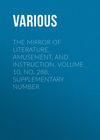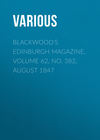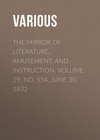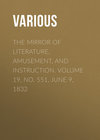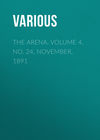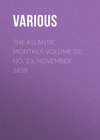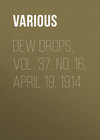Loe raamatut: «The Mirror of Literature, Amusement, and Instruction. Volume 10, No. 288, Supplementary Number», lehekülg 6
But if the navigation on that coast is no longer as perilous as it was, when the heroine of this story was buried, and the tower of C–r church is no longer a necessary land-mark, still her grave remains a pleasing memorial of one, whose active benevolence rose superior to the selfishness both of sorrow and of sickness; and enabled her, even on the bed of death, to contrive and will for the benefit of posterity.
It is strange, but true, that the name of this humble, but privileged being, is not on record; but many whose names are forgotten on earth, have been, I doubt not, received and rewarded in heaven.
The Bijou
Is a new adventurer in the "annual" field, and deserves a foremost rank as a work of art. Thus, the Child with Flowers, by Humphreys, after Sir Thomas Laurence, is really fit company for the president's beautiful picture; the Boy and Dog, by the same painter and engraver, is also very fine; but the selection of both of the pictures for one volume is hardly judicious. With Haddon Hall our readers are already familiar. Sans Souci, after Stothard, is a delightful scene. In the literature, almost the only very striking composition is Sir Walter Scott's illustration of Wilkie's painting of the baronet's own family, which, having been copied into every newspaper, we do not reprint. For our part, we do not admire the painting; there is too much rank and file for a family group. Mr. Hood has a Lament of Chivalry, in his best style; and a few Verses for an Album, by Charles Lamb, are to our taste.
A LAMENT FOR THE DECLINE OF CHIVALRY
BY THOMAS HOOD, ESQ
Well hast thou cried, departed Burke,
All chivalrous romantic work,
Is ended now and past!—
That iron age—which some have thought
Of metal rather overwrought—
Is now all over-cast!
Ay,—where are those heroic knights
Of old—those armadillo wights
Who wore the plated vest,—
Great Charlemagne, and all his peers
Are cold—enjoying with their spears
An everlasting rest!—
The bold King Arthur sleepeth sound,
So sleep his knights who gave that Round
Old Table such eclat!
Oh Time has pluck'd the plumy brow!
And none engage at turneys now
But those who go to law!
Grim John o' Gaunt is quite gone by,
And Guy is nothing but a Guy,
Orlando lies forlorn!—
Bold Sidney, and his kidney—nay,
Those "early champions"—what are they
But Knights without a morn!
No Percy branch now perseveres
Like those of old in breaking spears—
The name is now a lie!—
Surgeons, alone, by any chance,
Are all that ever couch a lance
To couch a body's eye!
Alas! for Lion-Hearted Dick,
That cut the Moslem to the quick,
His weapon lies in peace,—
Oh, it would warm them in a trice,
If they could only have a spice
Of his old mace in Greece!
The fam'd Rinaldo lies a-cold,
And Tancred too, and Godfrey bold,
That scal'd the holy wall!
No Saracen meets Paladin,
We hear of no great Saladin,
But only grow the small!
Our Cressys too have dwindled since
To penny things—at our Black Prince
Historic pens would scoff—
The only one we moderns had
Was nothing but a Sandwich lad,
And measles took him off:—
Where are those old and feudal clans,
Their pikes, and bills, and partizans!
Their hauberks—jerkins—buffs?
A battle was a battle then,
A breathing piece of work—but men
Fight now with powder puffs!
The curtal-axe is out of date!
The good old cross-bow bends to Fate,
'Tis gone—the archer's craft!
No tough arm bends the springing yew.
And jolly draymen ride, in lieu
Of Death, upon the shaft.—
The spear—the gallant tilter's pride
The rusty spear is laid aside,
Oh spits now domineer!—
The coat of mail is left alone,—
And where is all chain armour gone?
Go ask at Brighton Pier.
We fight in ropes and not in lists,
Bestowing hand-cuffs with our fists,
A low and vulgar art!—
No mounted man is overthrown—
A tilt!—It is a thing unknown—
Except upon a cart.
Methinks I see the bounding barb,
Clad like his Chief in steely garb,
For warding steel's appliance!—
Methinks I hear the trumpet stir!
'Tis but the guard to Exeter,
That bugles the "Defiance!"
In cavils when will cavaliers
Set ringing helmets by the ears,
And scatter plumes about?
Or blood—if they are in the vein?
That tap will never run again—
Alas the Casque is out!
No iron-crackling now is scor'd
By dint of battle-axe or sword,
To find a vital place—
Though certain Doctors still pretend
Awhile, before they kill a friend,
To labour through his case.
Farewell, then, ancient men of might!
Crusader! errant squire, and knight!
Our coats and customs soften,—
To rise would only make ye weep—
Sleep on, in rusty iron sleep,
As in a safety-coffin!
VERSES FOR AN ALBUM
Fresh clad from Heaven in robes of white
A young probationer of light.
Thou wert, my soul, an Album bright.
A spotless leaf but thought, and care—
And friends, and foes, in foul or fair,
Have "written strange defeature" there.
And Time, with heaviest hand of all,
Like that fierce writing on the wall,
Hath stamp'd sad dates—he can't recall.
And error gilding worst designs—
Like speckled snake that strays and shines—
Betrays his path by crooked lines.
And vice hath left his ugly blot—
And good resolves, a moment hot,
Fairly began—but finish'd not.
And fruitless late remorse doth trace—
Like Hebrew lore, a backward pace—
Her irrecoverable race.
Disjointed numbers—sense unknit—
Huge reams of folly—shreds of wit—
Compose the mingled mass of it.
My scalded eyes no longer brook,
Upon this ink-blurr'd thing to look,
Go—shut the leaves—and clasp the book!—
THE LITERARY POCKET-BOOK
Is this year resumed, but we think it is not so successful as, were its previous fasciculi. The "literary" is a good epithet for its sale among would-be authors, like the "Gentleman's" Magazine among a certain class of worthies. But of what use are such articles as the following to literary men:—The Seasons, by a Man of Taste, (like the carte of a restaurateur;) Sayings of a Man about Town; Remonstrance with J.F. Newton; Lines on Crockford's &c.—all amusing enough in their way, but, in a literary pocket-book, out of place, and not in good taste. The "lists," too, the only useful portion of the volume, are, in many instances, very incorrect. Apropos, how long has Morris Birbeck been dead? Our Illinois friend might be alive when the editor published his last pocket-book; but if he stands still, time does not. There is, too, an affectation of fashion about the work which does not suit our sober taste; but as a seasonable Christmas extract, we are induced to quote Winter from the Seasons:—
Now is the high season of beef; beef, which Prometheus killed for us at first, ere he filched the fire from heaven, with which to constitute it a beef-steak—that foundation of the most delightful of clubs, and origin of the most delightful of all memoirs of them. Nor be the sirloin, boast of Englishmen, forgot! nor its vaunted origin; which proves that the age of chivalry, despite of Burke, is not yet gone! Stewed beef too, and ample round, and filet de boeuf saute dans sa glace, and stewed rump-steaks, and ox-tail soup.
"Spirits of beef, where are ye? are ye all fled?"
Henry the Eighth.
No—when beef flies the English shores, then you may, as the immortal bard exquisitely expresses it, "make a silken purse out of a sow's ear." But mutton, too, invites my Muse. It is calculated that fifteen hundred thousand sheep are annually sacrificed in London to the carnivorous taste of John Bull. "Of roast mutton (as Dr. Johnson says) what remains for me to say? It will be found sometimes succous, and sometimes defective of moisture; but what palate has ever failed to be pleased with a haunch which has been duly suspended? what appetite has not been awakened by the fermentation that glitters on its surface, when it has been reposing for the requisite number of hours before a fire equal in its fervency?"
We quite agree with Dr. Johnson; but a boiled leg of mutton, its whiteness transparent through the verdant capers that decorate its candour, is not to be despised; nor is a hash, whether celebrated as an Irish stew, or a hachis de mouton, most relishing of rifacciamenti! Chops and garlic à la Francaise are exquisite; and the saddle, cut learnedly, is the Elysium of a gourmand.
Now also is the time of house-lamb and of doe-venison. Now is the time of Christmas come, and the voice of the turkey is heard in our land! This is the period of their annual massacre—a new slaughter of the innocents! The Norwich coaches are now laden with mortals; that, while alive, shared with their equally intelligent townsmen, fruges consumere nati, the riches of their agricultural county.
Let others talk as they will about the Greek and the Ottoman!—in cookery, I abhor Greece, and love Turkey. And yet how inconsistent I am in my politics! for I sometimes regard the partition of Turkey as a thing well purchased by the sacrifice of every Ottoman in the world—would they were all under my feet!—especially when I have the gout. I confess, the dismemberment of Poland did not affect me much. A man who is much accustomed to dismember fowls, will not care much about that of kingdoms.
Nor be the cod (a blessing on his head—and shoulders!) forgotten. Beautifully candid, his laminae separate readily before the tranchant silver, and each flake, covered with a creamy curd, lies ready to receive the affusion of molten (not oiled) butter, which, with its floating oyster-islands, seems in impatient agitation for the moment of overflowing the alluring "white creature," as a modern poet styles it.
